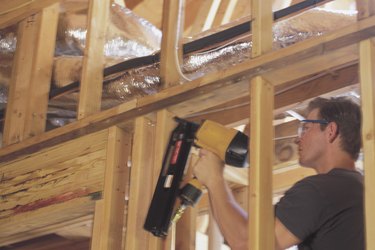
Pressure-treated lumber's chemical preservatives adversely react with many metal products, including unprotected fasteners. In carpentry, the term sinkers refers to vinyl-coated framing nails. While sinkers' vinyl coating allows them to drive or "sink" into framing materials quickly, it doesn't provide significant protection from corrosion. Thus, the copper-based preservatives in treated lumber often cause vinyl-coated steel sinkers to corrode prematurely. If you become familiar with construction industry recommendations regarding preservative-treated wood products, you can choose the right fasteners for your project.
About Coated Sinkers
Video of the Day
Carpenters use vinyl-coated sinkers for general construction, primarily wood-frame house construction. A vinyl-coated sinker consists of a long, smooth shank covered with a vinyl coating. The vinyl coating helps the nails drive and sink into common framing materials smoothly. Sinkers typically have checkered or serrated heads. Friction encourages a hammer's striking face to grip sinkers' heads, which prevents bending. Vinyl-coated sinkers are typically manufactured from steel alloys.
Video of the Day
About Preservative-Treated Lumber
Governmental authorities banned the lumber industry's favored wood-preservation compound, called chromated copper arsenate, or CCA, because contact with arsenate can lead to arsenic poisoning. The most common replacement for CCA is called alkaline copper quaternary, or ACQ. While ACQ is less toxic than CCA, its high copper content accelerates the corrosion of metal fasteners. You can determine a treated board's preservative by reading its lumber stamp. The stamp will read either ACQ or CCA. Due to regulatory restrictions, CCA-treated products are no longer available in retail stores or lumber yards. However, you might find them installed in older homes.
Acceptable Fasteners for Preservative-Treated Lumber
While vinyl-coated sinkers corrode from contact with pressure-treated wood, several corrosion-resistant fasteners are suitable for use with preservative-treated lumber products. For load-bearing or framing applications, building codes and manufacturers typically recommend hot-dipped galvanized fasteners or stainless steel fasteners. Alternatives to hot-dipped or stainless steel fasteners include copper or bronze fasteners. However, copper and bronze fasteners usually are not acceptable for residential framing or construction projects. Although relatively expensive, stainless steel fasteners exhibit the most resistance to corrosion. Note that electroplated galvanized fasteners have a thin protective layer and are less resistant to corrosion than are hot-dipped galvanized fasteners.
Where to Use Vinyl-Coated Sinkers
Fastener manufacturers recommend vinyl-coated sinkers for interior carpentry and framing projects, such as stud wall construction. If you choose to use sinkers for exterior stud wall construction, remember that the wall's bottom plate might contact a treated sill plate. Avoid using coated sinkers for exterior projects. Sinkers not only corrode under exterior conditions, but also "bleed" streaks of rust and compounds across finished wood surfaces.
- Raised Floor Living: Preservative-Treated Wood Products
- Universal Forest Products: ACQ Pressure-Treated Wood Fastener Information Sheet
- International Association of Certified Home Inspectors: Evaluating Problems with Fasteners
- Conrad Forest Products: Fasteners & Treated Wood
- Fine Homebuilding: The New Pressure-Treated Wood